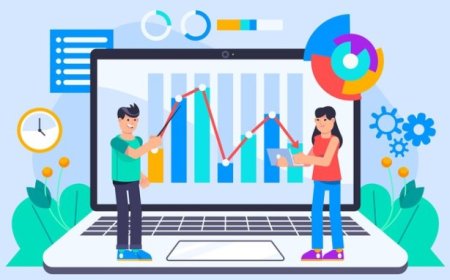Why data science is important to your business decisions?
Discover how data science enhances business decisions. Learn the value of data-driven insights in boosting efficiency, predicting trends, and improving outcomes.

Data science works as the smart detective for your company, exploring deep into the data to find valuable information that improves decision-making. Imagine that you are faced with a difficult challenge, but rather than just Guessing, you have a wealth of information (data) at your disposal that points you in the right direction. That's exactly what data science is about. It carefully sorts through all of the data that is available, finds patterns, and provides you with strong suggestions. Therefore, putting your trust in data science allows you to steer your organization along a road of educated choices instead of depending on intuition or guess. By doing this, you maximize the use of your resources and foster a culture of planned, accurate decision-making, which will ultimately drive your company toward effectiveness, efficiency, and prosperity.
Imagine a retail company that wants to improve the way it manages its inventory. In the lack of data science, intuition, and past sales data would be used to determine stock levels. But the company can now analyze a wide range of data, including historical sales, current market patterns, weather forecasts, and even moods on social media, thanks to data science. The company is better able to predict future demand thanks to data science. Through the process of finding correlations and trends within the data, it is possible to predict which products will have strong demand at particular times. This lowers the possibility of shortages or excess by enabling the company to adjust its inventory levels properly.
Complications and limitations in traditional decision-making processes
Dependency on Intuition: Before utilizing statistical data and objective analysis, traditional decision-making frequently relies on people's gut feelings, feelings, and previous experiences. This dependence on instinct may result in judgments that are by the individual and do not fairly represent what's happening.
Limited Data Usage: Conventional approaches might not fully take advantage of the data at hand, or they might rely on out-of-date or lacking data, which would lead to decisions that only partially take into account the opportunity or problem at hand. In the absence of timely and thorough data, decision-makers could miss important information that could help them make more well-informed decisions.
Slow Decision-Making: Conventional methods of decision-making sometimes include several levels of approval and discussion, and they can be complex and time-consuming. Missed chances might arise from this slow pace, particularly in lively commercial situations where responsiveness and agility are crucial for success.
Lack of Analysis: Decisions made through traditional means may be based more on guesses than on solid facts because there may not be an in-depth examination and assessment of possible outcomes. Decision-makers may be faced with unclear and a higher risk of unforeseen outcomes if alternative possibilities are not carefully examined and considered.
Subjectivity and Bias: In traditional decision-making procedures, human judgment is subject to subjective views, emotions, and personal flaws that might affect the process. These biases have the potential to distort judgments so that they favor some people or viewpoints over others, undermining the process' objectivity and equity.
Inflexibility: Organisations may find it challenging to adjust to changing conditions or new knowledge due to the hardness and resistance to change in traditional decision-making processes. This rigidity may limit creativity and adaptability, making it more difficult for the company to take advantage of opportunities and successfully handle new obstacles.
Ineffective Communication: When decision-makers communicate ineffectively or unclearly, it can cause confusion and a misunderstanding of goals. Ineffective communication can hinder coordination and collaboration, leading to decisions that are not as good as they could be and don't fully make use of the knowledge and insights that stakeholders have to offer.
Insufficient Risk Management: Organisations may be exposed to unexpected challenges and interruptions if traditional procedures are not able to adequately identify or mitigate risks. Organizations that lack strong risk management procedures run the danger of failing to recognize and respond to possible threats, which raises the possibility of financial, operational, and reputational risks.
Lack of Accountability: It may be difficult to learn from mistakes or make better decisions in the future when traditional decision-making methods lack clear responsibility and accountability. Decision-makers could avoid accepting responsibility for their choices if there isn't a clear structure in place for assigning accountability, which would result in a lack of accountability for their actions.
Opposition to Innovation: Conventional methods may be reluctant to accept novel technologies or creative fixes, which restricts chances for advancement and expansion. This aversion to change might impede the organization's ability to innovate, adjust to changing market conditions, and take advantage of new possibilities and trends.
How data science can assist in your business decision-making
-
Finding Trends and Patterns: Data science helps you to look for patterns and repeated topics in your company's data. Let's say you notice an increase in jacket and coat sales each winter. It's a pattern. You may make better plans by using data science to identify these trends.
-
Judging Future Events: It's similar to guessing about what will happen next based on past events. For instance, you can forecast that this year's sales will increase if you observe that they do so each holiday season. This concept is used by data science to assist you in speculating about the future of your company.
-
Customer Insights: Developing an understanding of your client's preferences is known as "customer insights." It's similar to realizing that your target market favors blue shirts over red ones. Data science looks at what your customers purchase and say about your items to assist you in determining these preferences.
-
Optimizing Operations: This refers to improving the efficiency of your company. Assume for a moment that you discover your delivery trucks are arriving at customers late. Data science can assist in determining the cause and offer solutions, such as modifying delivery routes or adding more vehicles.
-
Risk Management: Risk management is all about being prepared for the worst-case event. You can prepare for inclement weather if you are aware of its impact on sales. Data science looks at a variety of elements, such as changes in the economy or weather forecasts, to assist you in identifying these risks.
-
Personalized Recommendations: Similar to how Netflix makes movie recommendations for you based on your viewing history, this feature is called personalized recommendations. For your company, data science performs the same function by making recommendations for goods or services to clients based on what they have previously purchased or browsed.
-
Competitive Analysis: It's like spying on your competitors to see what they're doing and how well they're doing it. Data science helps you do this by looking at things like their prices, customer reviews, and advertising strategies. This helps you figure out what you can do better to stay ahead in the market.
For your company, data science is similar to having a highly intelligent detective. It assists you in finding important insights concealed in your data, resulting in more informed choices and improved results. Businesses may anticipate future trends, comprehend client preferences, streamline processes, successfully manage risks, and outperform rivals by utilizing data science. Adopting data science promotes an educated decision-making culture, makes the most use of available resources, and increases your company's productivity and profitability.




































